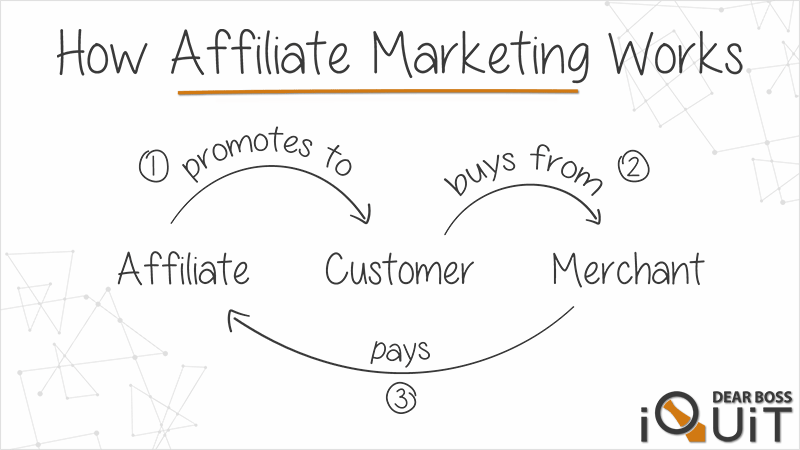To the layman’s eye, affiliate marketing might look almost identical to MLM (Multi-Level Marketing)…
However, in reality, they have practically nothing in common.
Since MLM is usually associated with illegal pyramid schemes, such misconceptions tend to hold many people back from getting involved in affiliate marketing which is actually a perfectly legit and potentially very lucrative online business model.
If you’ve been mistaking affiliate marketing for MLM, you’re in the right place!
In this article, I’m going to shed some light on how both affiliate marketing and MLM work, all the differences between them, as well as some official statistics that’ll help you fully understand which of them is actually worth utilizing towards building a sizeable income.
Let’s get started!
No, affiliate marketing is not MLM. Whoever thinks otherwise has no clue about either what affiliate marketing or what MLM really is. Yes, some aspects of the two might seem similar to the untrained eye but ultimately, they have nothing in common.
Let’s take a closer look at how each of those money-making models works…
Best Affiliate Marketing Courses
Best Affiliate Courses
What is Affiliate Marketing?
Simply put, affiliate marketing is the process of earning commissions for promoting products and/or services created and distributed by another company or individual to paying retail customers.

Here’s an overview of the typical steps involved in the process of utilizing affiliate marketing:
Step 1:
You sign up for a merchant’s affiliate program.
Step 2:
The merchant gives you a unique affiliate link that’ll redirect anyone who clicks it to their online store.
Step 3:
You start sharing your affiliate link throughout your digital marketing assets (blog, YouTube channel, social media page, etc).
Step 4:
When someone (let’s call him “John”) clicks on your affiliate link he’ll be sent to the merchant’s online store.
Step 5:
The merchant recognizes that John landed on their online store after clicking on your affiliate link.
Step 6:
If John makes a purchase on the merchant’s online store, the merchant will pay you a commission.
For a more in-depth look into affiliate marketing, make sure to check out What Is Affiliate Marketing and How Does It Work?
What is Multi-Level Marketing?
Multi-Level Marketing (MLM) is a money-making model that involves earning commissions for retail sales generated not only by you but also by other distributors that reside on multiple levels throughout your downline, such as:
- your recruits (1st level)
- the recruits of your recruits (2nd level)
- the recruits of your recruits’ recruits (3rd level)
- and so on…
To be allowed to take part in the compensation plan of any given MLM, you’ll be required to pay an entry fee (usually disguised as a “starter kit”).
Furthermore, 99.9% of MLMs “force” their participants to make additional recurring purchases by offering incentives such as:
- Rank Advancements
- Higher Commission Rates
- Bonus Qualifications
- Overrides on More Levels
- and more
Such ongoing expenses is one of the main reasons that according to the FTC, the vast majority of MLM participants either lose money or make very little to no money whatsoever.
Any MLM that’s put together a compensation plan which is geared towards rewarding its participants mostly based on their recruiting efforts rather than retailing products is considered an illegal pyramid scheme.
Affiliate Marketing vs. MLM: The Differences
To the untrained eye, affiliate marketing might seem pretty similar to MLM but truth is that the two models differ in numerous aspects, such as:
- Model Mechanics
- Monetary Investment
- Marketing Channels
- Income Potential
- & Flexibility
Let’s take a closer look.
1. Model Mechanics
Building an income as an MLM representative takes place in two phases:
- Directly selling products/services to retail customers
- Earning commissions based on the direct sales of other recruits in your downline
The vast majority of MLM reps forsake direct retail sales and focus most of their time and effort on scaling their downline.
That’s because getting paid override commissions on the retail sales of downline recruits will eventually result in much higher cheques for much less effort.
The mechanics of affiliate marketing are quite different…
For start, affiliate marketers don’t operate as direct sellers but rather as middlemen who get paid for referring retail customers to the online merchants they’re affiliated with.
Moreover, affiliate marketing doesn’t involve recruits, multiple levels, or downlines… No affiliate merchant will ever pay you commissions on the sales made by another affiliate marketer.
Affiliate marketing is the process of getting paid commissions ONLY on the retail sales generated as a result of YOUR VERY OWN customer referrals.
2. Monetary Investment
Two defining characteristics of MLMs are:
- Mandatory entry fees (usually disguised as “starter kits”)
- Recurring incentivized purchases (often by subscription)
Unlike MLM, 99.9% of all affiliate programs out there are completely free to join and involve zero ongoing expenses.
3. Marketing Channels
The marketing channel leveraged by the vast majority of MLM reps towards selling and recruiting is word of mouth to friends, family, colleagues, and acquaintances, usually via:
- Hosting home parties
- Holding local events
- Engaging in plain conversation
A minority of MLMs might provide their participants with online marketing materials (e.g. web banners, replicated websites, PDF product catalogs, etc) that could be utilized towards attracting customers and recruits mostly via social media.
Contrary to MLM, all affiliate promotions take place on the internet by utilizing digital marketing methods, such as:
- Pay Per Click (PPC)
- Search Engine Optimization (SEO)
- Video Marketing
- Blogging
- Podcasting
- Email Marketing
- Social Media Marketing
- Influencer Marketing
- & more
4. Income Potential
Based on a roundup of Multi-Level Marketing Statistics I put together a while ago, less than 3% of MLM participants manage to build an income that exceeds $25,000 per year.
On the contrary, those Affiliate Marketing Statistics reveal that the percentage of affiliate marketers who make over $25K per year is 30%.
This basically means that affiliate marketers are 10 times more likely to earn over $25,000 per year than MLM reps.
Furthermore, while the percentage of affiliate marketers who make over $100,000 per year is about 10%, the percentage of MLM reps who earn as much is only 0.05%.
Subsequently, affiliate marketers are 191 times more likely to earn over $100K per year than MLM reps.
Having said that, affiliate marketing seems to be offering a much higher income potential than MLM.
5. Flexibility
Last but not least, affiliate marketing is much more flexible than MLM…
As an affiliate marketer, you have to ability to endorse millions of different products sold by thousands of different merchants from all around the globe.
MLM participants are limited to promoting a specific set of products sold by the MLM company they’ve signed up for.
Furthermore, if one of the affiliate merchants or offers you’re endorsing underperforms, you could simply shift to endorsing another one without any hassle whatsoever.
On the contrary, the process of shifting MLMs is much more arduous and complicated…
If you’ve devoted time, effort, and money towards advancing in a specific MLM, quitting to join another MLM will most certainly entail starting again from square one.
Affiliate marketing FAQs
Affiliate marketing is an online business model that involves promoting products or services created and distributed by third-party online merchants in exchange for getting paid a commission for each sale you refer.
In layman’s terms, affiliate marketing is the process of being compensated for helping businesses sell to more customers.
Here’s a bird’s eye view of how affiliate marketing works.
- You join a merchant’s affiliate program
- The merchant gives you a unique affiliate link that points to their e-shop
- You promote your unique affiliate link online (blog, forums, social media, paid ads, etc.)
- Every time someone clicks on your unique affiliate link and makes a purchase on the merchant’s e-shop, the merchant pays you a commission
There are thousands of successful affiliate marketers all around the world. Some of the most well-known ones are:
- Pat Flynn
- Matt Diggity
- Matthew Woodward
- Doug Cunnington
- & more
You can check out a roundup of my 17 favorite examples of affiliate success and their backstories right here.
- Billion-dollar industry
- Very low startup & operational expenses
- Huge income potential
- Flexible & versatile
- Passive income
- Simple to implement
- No technical background
- No customer support
- No physical setup
Affiliate marketers can be divided into five main income groups:
- Total beginners: $0 – $20,000 per year
- Low-level affiliates: $20,000 – $50,000 per year
- Intermediate affiliates: $50,000 – $100,000 per year
- High-level affiliates: $100,000 – $500,000 per year
- Super affiliates: $500,000+ per year
According to PayScale, the average annual income for affiliate marketers in the US is over $54,000 per year. Statistics reveal that 13% of affiliates earn more than $75,000 per year.
Some of the factors that influence how much you earn as an affiliate marketer include:
- seniority
- target niche
- available resources
- previous experience
- marketing efforts
- & overall mindset
Here’s a rough income growth timeline of a typical affiliate marketing business:
- months (0-3): no earnings
- months (3-6): first affiliate sale
- months (6-12): $100-$500 monthly
- months (12-18): $1000 monthly
- months (18-24): $3000+ monthly
This timeline isn’t a guarantee of future performance but rather a mere approximation of the income growth of an average affiliate business. Your own timeline could be shorter or longer than projected.
Over the years, I’ve seen aspiring affiliates striking a gold vein just a few months into the industry. On the other hand, I personally know people who’ve been struggling to grow their affiliate revenue to $1000 per month for several years.
Affiliate marketing is one of the most affordable money-making models out there.
Here’s a breakdown of everything you need to get started as an affiliate marketer along with their associated costs:
- web hosting & domain name: $2.95/month (Bluehost)
- keyword research tool: $49/month (Jaaxy)
- expert guidance: $49/month (Wealthy Affiliate)
- email autoresponder: Free for up to 1000 subs (MailerLite)
Please note that on top of expert guidance, Wealthy Affiliate also provides free access to hosting and a keyword research tool so you don’t have to purchase them separately.
Yes, you can do affiliate marketing without a website by promoting your affiliate links on other marketing channels, such as:
- Social Media
- Paid Ads
- YouTube
- Podcast
- etc.
The process of getting started with affiliate marketing can be broken down into the following four simple steps:
- Pick a niche
- Launch a blog
- Build an audience
- Promote affiliate products
No, you don’t.
Affiliate marketing is very simple to get started with by virtually anyone regardless of age, education, background, available capital, tech-savviness, professional network, etc.
In fact, most 6-figure affiliate marketers were no more experienced than you currently are when they first ventured into the affiliate marketing industry.
Nonetheless, being knowledgeable in fields like marketing, sales, content production, business management, etc., could help you reach your financial goals somewhat faster.
Conclusion
Affiliate marketing doesn’t exhibit any of the defining characteristics of MLM…
First, it doesn’t involve any recruitment whatsoever. Secondly, affiliate success depends on actual retail sales not building a downline.
Also, unlike MLM, 99.9% of all affiliate programs out there are completely free to join and involve zero ongoing expenses.
Lastly, affiliate marketers don’t get paid based on the sales of other affiliate marketers but rather only on the retail sales they personally generate.
Having said all that, affiliate marketing is NOT MLM.
Frankly, whoever thinks otherwise has no clue about either what affiliate marketing or what MLM really is.
The two models have literally nothing in common.
Have any questions?
Leave a comment right below or contact me right here.
I’ll be more than happy to help you out!
All the best,
Harry, Founder & Editor at dearboss-iquit.com




